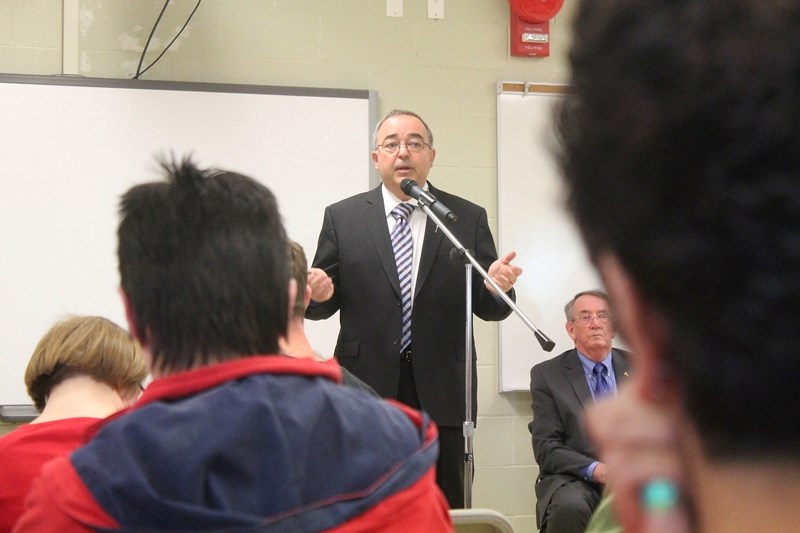Fielding questions from local parents and service providers as well as several Opposition MLAs about how funding cuts will affect services offered under the provincial Persons with Developmental Disabilities program (PDD), Alberta's associate minister of services for persons with disabilities repeated a refrain of “If you need services in Alberta, you will get services.”
Frank Oberle held a standing-room only community discussion at Olds' Community Learning Campus on May 22 to address concerns about the announced $42 million in cuts to the provincial Community Access supports budget and what those cuts mean to services offered through PDD.
The PDD program provides cash for staff to help adults with developmental disabilities to live independently, find and keep jobs and participate in their community.
The funding cuts were announced as part of the province's 2013 budget and changes to programs designed to help persons with developmental disabilities will begin taking effect July 1.
The gathering was one of 19 discussions currently being held around the province to address how the cuts will affect PDD services.
Oberle, who was joined at the discussion by Blaine Gillis, chief executive officer for the PDD program in the Central Region, which includes Olds, and Brenda Lee Doyle, Alberta's assistant deputy minister for the disability services division, said because of “challenging” financial conditions in the province right now, the government needs to change and streamline PDD's “business model” and make the program “efficient, sustainable and accountable.”
The way to do that, he added, was to make sure people are receiving the right amount of support to fit their needs.
In order to determine those needs, Oberle said, the government will replace a patchwork of varying and often inconsistent assessment tools around the province with a standardized assessment.
The province will continue to rely on an international assessment tool known as the Supports Intensity Scale (SIS), which measures, through interviews, the support an individual with developmental disabilities needs in personal, work-related, and social areas to help him or her to be successful.
Discussions with families and service providers will also be a part of the assessment program.
“We will use a streamlined and consistent approach for assessment and those assessed needs will help us determine the supports an individual requires,” Oberle said.
These steps, he added, will help make the allocation of funds to the PDD program more efficient and allow for cost savings by ensuring no one is receiving more services than are necessary while making sure anyone who does need provincial assistance gets the support they need.
Gillis said this “one program approach” to assessments within PDD's six provincial regions will address inconsistencies in the support system and ultimately allow the program to continue to offer services despite the funding cuts.
“The bottom line is we want to avoid individuals getting too much or too little support. This will ensure an equitable distribution across the province. It will contribute to the long-term sustainability of our program and it will ensure that we have resources in place for new uptakes.”
He added each of the six regions will receive this year's funding this week.
Gillis also addressed questions and concerns about the accuracy about SIS, saying the assessment system “has been proven to be a valid and reliable tool to assess the support need of individuals… throughout the world, not just here in Alberta.”
And having conversations with families and individuals seeking PDD services will help provide the most accurate picture possible of a person's needs, he added.
Bruce Rowe, MLA for Olds-Didsbury-Three-Hills, challenged Oberle at the discussion, however, about how he could pledge to make sure every person with disabilities has their needs met when such massive budget cuts are taking place, regardless of how the process of assessment changes.
“I don't think that any family member anywhere is going to say ‘My child is getting too much.'”
Oberle responded by saying the overall “bundle” for disability services is actually higher this year at $670 million and he said all types of community support services will continue to be available.
They might just be called something different or funded from a different budget, he added.
Jeff Wilson, MLA for Calgary-Shaw, asked Oberle why the province didn't carry out the assessment program using the SIS tool and discussions with families and individuals in need before announcing the planned cuts, adding the government is putting the “cart before the horse.”
“You have no idea what the impacts are going to be at this point,” he said.
Oberle responded, however, that nearly 90 per cent of assessments have already been completed.
“We have a pretty good statistical idea of how this is going to turn out.”



